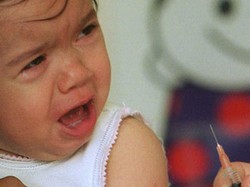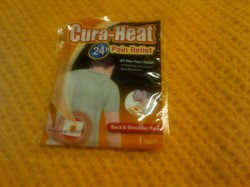Despite the fears of a very vocal minority of parents, who not only refuse to have their children vaccinated, but see a government conspiracy in the requirements, childhood immunizations are on the rise. For the oldest and well-known vaccinations such as the polio vaccination, immunization rates are above 90%. In fact less than 1% of children, only 0.6% of the children in the United States receive no vaccinations. For the United States as a whole, polio vaccination is at 93%; measles, mumps, and rubella (MMR) is at 92%, chicken pox (varicella) is at 91% and the diphtheria, tetanus, and pertussis (whooping cough) is at 96%.

Childhood Vaccination Rates Remain High in the United States
by Digby_Adams
Over 90% of children between the ages of 19 and 35 months receive vaccinations in accordance with CDC guidelines.
MMR Vacination Rates by State
There is a geographic difference in vaccination rates when examined by state. Of the 50 US states plus the District of Columbia, 13 of these had vaccination rates below the stated public health goal of 90%. Nine of these states are in the western half of the country. Montana (85.1%) had the lowest MMR vaccination rate, followed by Utah (85.5%), Nevada (87.0%), Idaho (87.2%), Arizona (87.7%), Alaska (88.4%), New Mexico (88.8%), Colorado (89.3%) and Washington (89.8%). Only two are located in the Northeast - New Jersey (86.1%) and New York (89.3%). In the South, Louisiana (89.5%) has the lowest MMR vaccination rate. In the Southeast, Kentucky (89.5%) is the lowest.
MMR States with under a 90% vaccination rate
13 of the 50 US States have less than 90% of their children vaccinated for measles, mumps and rubella.
Childhood Vaccination Coverage for the Modified Series
While all states had reached at least 85% coverage for the MMR vaccination. The modified vaccine series varies from Nevada (61.3%) to Wisconsin (82.7%). Across the United States, when state residence is not taken into account, 72.7% of children have received the modified vaccine series. The series as defined by the CDC includes ≥4 doses DTP/DT/DTaP vaccine (diphtheria, tetanus toxoids, and pertussis vaccine; diphtheria and tetanus toxoids vaccine; and diphtheria, tetanus toxoids, and acellular pertussis vaccine), ≥3 doses of poliovirus vaccine, ≥1 dose of any measles-containing vaccine, ≥3 doses of HepB, ≥1 dose of varicella vaccine, and ≥4 doses of PCV. Haemophilus influenzae type b vaccine is excluded.
Only 4 states - Florida (81.0%), New Hampshire (81.0%), Michigan (81.3%) and Wisconsin (82.7%) are above 80% childhood vaccination rates for the modified vaccine series.
States Below the Modified Vaccine Series Average of 72.7% Coverage
How does the CDC collect this childhood vaccination data.
The National Immunization Survey (NIS) is based on information collected quarterly through a randomized phone survey. So there could be a bias towards households that have landlines and against those that do not. It is followed by a mail survey to the vaccination providers. For the 2010 NIS, 63.8% of households answered the questions. Vaccination providers returned vaccination records for 71.2% of all children with completed household interviews, for a total of 17,004 children.
You might also like
Piriformis - an unusual form of sciaticaOnly 10% of the population have their sciatic nerve pass through their pirifo...
Surviving the PandemicSurviving the pandemic will require keeping a good state of mind, which can h...



 Catholic Wedding Invitationson 02/17/2016
Catholic Wedding Invitationson 02/17/2016
 Christian Wedding Invitations Decorated with a Crosson 02/14/2016
Christian Wedding Invitations Decorated with a Crosson 02/14/2016
 Small Biker Patches Make Great Stocking Stufferson 11/15/2015
Small Biker Patches Make Great Stocking Stufferson 11/15/2015
 Hawaiian Wedding Invitations - Beautiful and Budget-Friendlyon 08/24/2015
Hawaiian Wedding Invitations - Beautiful and Budget-Friendlyon 08/24/2015


Comments
It is good to see children are being vaccinated despite the fear of some minority of the parents. I don't know how does it work in USA, but here parents can end up on court if they don't allow vaccination of their children, and they get sick by some of those diseases.
If we expect to eradicate diseases such as Polio, diphtheria and others, then vaccination is the only way to do it. If one is not vaccinated, he can be source of infection and carrier in the future. These ones would be threat to others who weren't able to get vaccinated by some other medical conditions.
Thanks for the insightful tips on childhood vaccinations, both my daughters are up to date. It also seems they keep adding to the list of recommended vaccinations. Oh what to do, what to do indeed. Very interesting and helpful thanks
My second child had all the vaccines. My older daughter caught the chicken pox just before we were going to take her in to get the vaccine, and boy, was I sorry. I was pregnant at the time, and my husband was out of town.